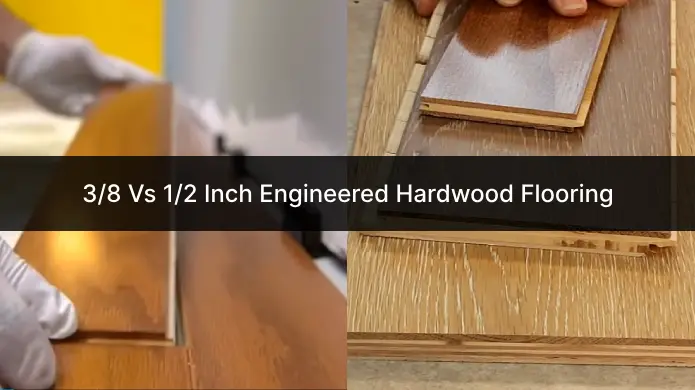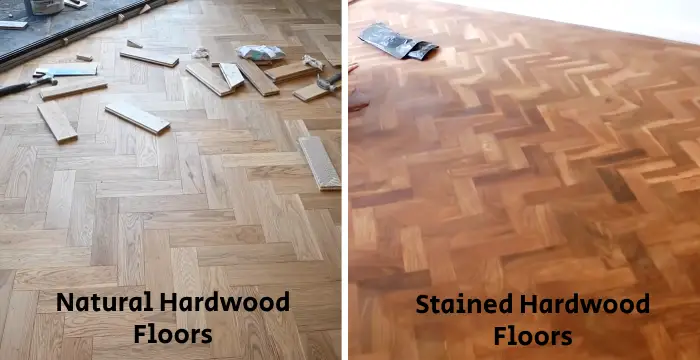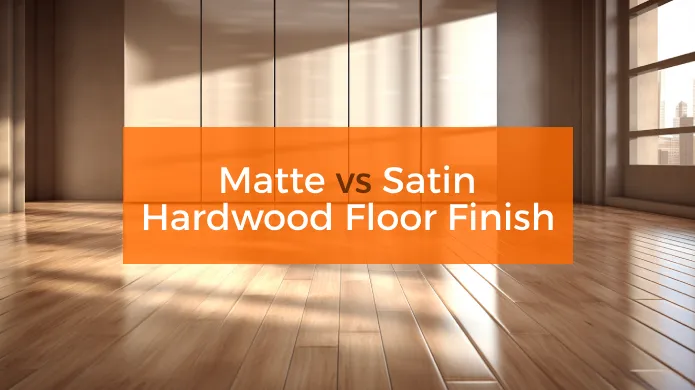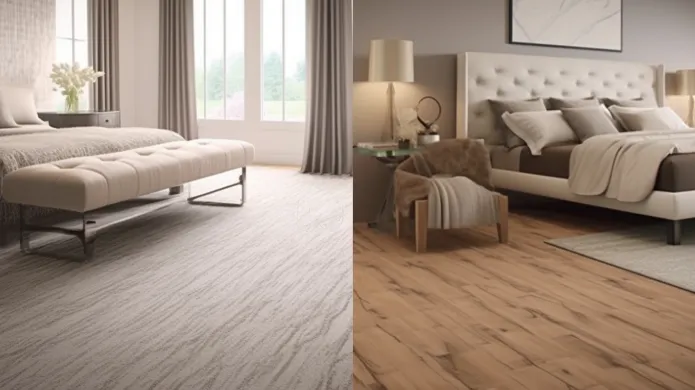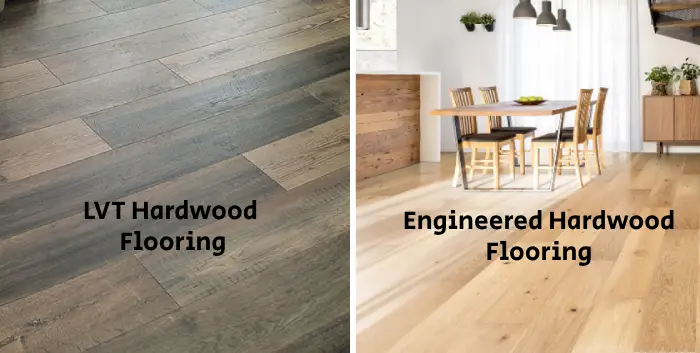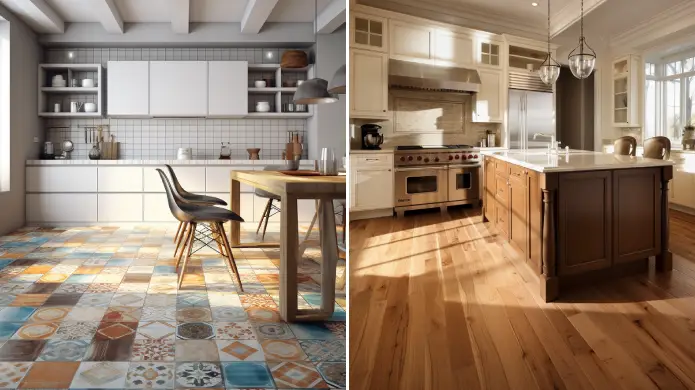When attempting to achieve the timeless beauty of real wood flooring, two popular options stand out: SPC (Stone Polymer Composite) and engineered hardwood. While both offer a wood-like appearance, they differ in construction, durability, maintenance, and cost.
SPC is made from stone and plastic composites, while engineered hardwood is made from layers of wood with a top layer of hardwood veneer. But in terms of durability, SPC is often more durable and resistant to water, scratches, and dents than engineered hardwood.
Today, we’ll explore the differences between SPC and engineered hardwood flooring and help you decide. By the end of this article, you’ll better understand which flooring option is best for your home and lifestyle. So continue reading.
SPC vs Engineered Hardwood: Comparisons
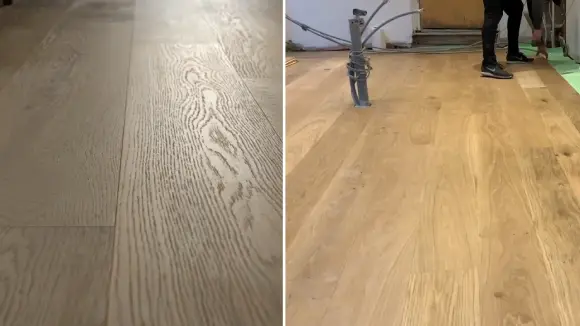
There are several important differences if you’re considering SPC and engineered hardwood.
1. Construction:
Regarding construction, engineered hardwood has a top layer of real wood, while SPC flooring has a rigid core composed of stone polymer composite materials. This difference in construction affects each flooring type’s durability, moisture resistance, and temperature resistance.
Let’s take a closer look at the construction of both flooring types in the table below:
| Construction | Engineered Hardwood | SPC Flooring |
| Top Layer | Real Wood | Decor Film |
| Core Composition | Artificial Core | Stone Polymer Composite |
| Durability & Resilience | Moderate | High |
| Moisture Resistance | Moderate | High |
| Temperature Resistance | Moderate | High |
2. Visual Appeal and Aesthetics:
In terms of aesthetics, both types of flooring offer a variety of design options. Here are some key differences to consider when choosing between SPC and engineered hardwood:
- SPC flooring is designed to mimic the appearance of real wood, but it doesn’t have the same natural grain and color variation that you’ll find in real wood. This can be a downside for those who value the unique look of natural wood.
- Engineered hardwood, on the other hand, offers a more authentic wood look with its natural wood surface layer. It’s available in various wood species and styles, offering a wider range of design options than SPC flooring.
- SPC flooring comes in various styles and colors, allowing you to find a look that suits your taste. It’s also more water-resistant than engineered hardwood, making it a good choice for areas with high moisture levels such as bathrooms or kitchens.
3. Durability and Resistance:
You want flooring that can withstand wear and tear, so durability and resistance are essential when choosing between SPC flooring and engineered hardwood.
While engineered hardwood is strong and durable, it’s susceptible to water damage. Exposure to moisture can cause swelling and warping, making it less suitable for areas prone to spills or high humidity.
SPC flooring may be a better choice if you live in a humid area or have a bathroom or kitchen with high moisture levels. It’s highly moisture-resistant, making it ideal for areas with high humidity.
In addition to water resistance, SPC flooring is more durable and resistant to scratches, impacts, and wear than engineered hardwood. This makes it a better choice for high-traffic areas or homes with pets.
4. Installation:
Installing new flooring can be an exciting project, and consider which option will be easiest to install in your home. Regarding installation, SPC flooring is the winner in terms of ease and convenience.
Here are some reasons why:
- SPC flooring features a glueless, easy-click installation system. This means you don’t need any adhesives or nails to install it, making it a DIY-friendly option. You can simply snap the planks together and lay them on your subfloor.
- Unlike engineered hardwood, SPC flooring doesn’t require any acclimation time. This means that you can install it immediately after bringing it home without having to wait for it to adjust to the temperature and humidity of your home.
5. Maintenance and Care:
Maintaining your new SPC flooring is a breeze. Its non-porous surface repels water and stains, making it easy to clean and maintain. Daily sweeping or vacuuming is all needed to keep your floors spotless.
Occasionally, you can wash your SPC flooring using mild cleaning solutions to maintain its shine and luster. Unlike engineered hardwood, you don’t need to wax or refinish SPC flooring, saving you time and money.
Conversely, engineered hardwood requires more maintenance and care to keep it looking its best. This type of flooring requires regular cleaning with hardwood floor products to maintain its appearance and protect against moisture damage.
You may need to take special care to avoid scratches and dents on the surface. Refinishing and sanding may be possible, depending on the thickness of the top wood layer. While engineered hardwood has a unique and natural appearance, it requires more attention than SPC flooring to keep it looking its best.
6. Environmental Considerations:
Regarding environmental impact, it’s important to consider the materials used to construct your flooring. While some engineered hardwood flooring products may contain toxic chemicals like formaldehyde, SPC flooring is certified as formaldehyde-free and environmentally friendly.
The glue-free manufacturing process of SPC flooring also contributes to better indoor air quality. To better understand the environmental considerations between SPC and engineered hardwood flooring, take a look at this table:
| Factor | SPC Flooring | Engineered Hardwood |
| Chemical Use | Formaldehyde-free | May contain formaldehyde in construction or adhesives |
| Manufacturing Process | Glue-free | May use glue in construction |
| End of Life | Recyclable | Not recyclable |
7. Cost:
Engineered hardwood flooring prices can vary significantly, depending on factors like wood species, the thickness of the wear layer, and overall quality. It generally falls within a higher price range compared to SPC flooring.
In contrast, SPC flooring is generally more cost-effective than engineered hardwood. This is because it’s made from a combination of limestone and stabilizers, which makes it highly durable and resistant to wear and tear.
Is SPC flooring better than hardwood flooring?
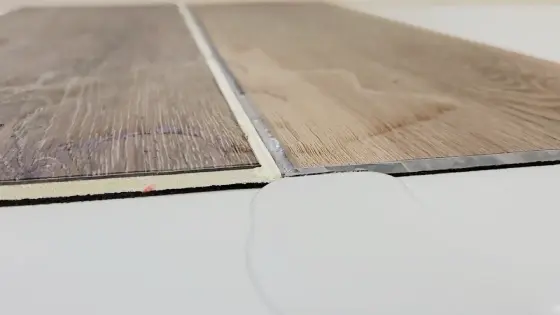
Although hardwood flooring has a classic look, SPC flooring offers greater durability and easier maintenance. SPC, or stone plastic composite, is made from a mixture of limestone powder, PVC, and stabilizers, making it highly resistant to scratches, dents, and stains.
In addition, SPC is waterproof, making it a great option for high-moisture areas such as bathrooms and basements. Here are three reasons why SPC flooring might be a better choice than hardwood flooring for your home:
- SPC flooring can withstand heavy foot traffic without showing wear and tear, making it a great option for families with kids and pets.
- SPC flooring requires minimal maintenance, as it can be easily cleaned with a simple mop and bucket. Hardwood, however, requires regular sanding and refinishing to maintain its appearance.
- SPC flooring is more cost-effective than hardwood flooring, making it a great option for homeowners on a budget who still want a durable and attractive flooring option.
Can SPC flooring be used in the kitchen?
SPC flooring is perfect for the kitchen because it’s waterproof, stain-resistant, and durable. It can handle high-traffic areas and spills without any damage. The flooring features a stone-plastic composite core that provides excellent stability and resistance to water, making it ideal for moisture-prone areas.
The top layer of the flooring is designed to be scratch-resistant and easy to clean, making maintenance a breeze. With a wide range of patterns and colors, SPC flooring can match any style and won’t be ruined by stains or spills.
Is SPC an engineered flooring?
You’ll be pleased to know that SPC is a superb substitute for traditional engineered hardwood flooring. Although it may not have the same natural wood look and feel as hardwood, SPC offers several advantages that make it a popular choice among homeowners and builders alike.
Here are some key benefits of SPC as an engineered flooring option:
- Waterproof: Unlike hardwood, SPC is completely waterproof, making it an ideal choice for areas prone to moisture such as bathrooms, kitchens, and basements.
- Durability: SPC is extremely durable and resistant to scratches, dents, and stains, making it a great choice for high-traffic areas in the home.
- Easy to maintain: SPC is easy to clean and maintain, requiring only regular sweeping and occasional mopping to keep it looking new.
- Affordability: SPC is generally less expensive than hardwood, making it a cost-effective flooring option for those on a budget.
- Environmentally friendly: SPC is made from natural limestone powder and doesn’t require the harvesting of trees, making it an environmentally friendly choice for those concerned about sustainability.
What are the disadvantages of SPC flooring?
If you’re looking for a flooring option that can withstand heavy foot traffic and is scratch-resistant, note that SPC may not be the best choice. While it is a durable option, it is not as scratch-resistant as other hardwood or ceramic tiles. This means it may not hold up well in high-traffic areas or homes with pets.
Also, SPC flooring is thinner than other options and has less cushioning underfoot. This means that it may be less comfortable to walk for extended periods. It’s also important to note that SPC flooring needs to be applied to a flat floor, which means that any bumps or unevenness in the subfloor may be visible.
What is the life expectancy of SPC flooring?
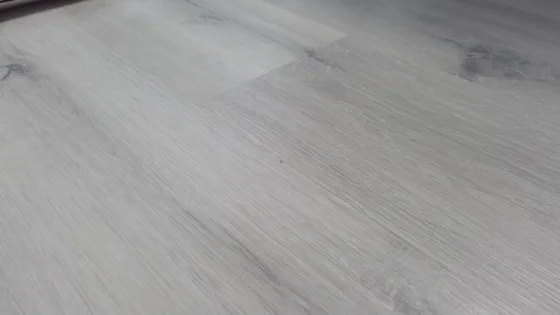
With proper maintenance and careful use, SPC flooring can last more than 30 years, double the average lifespan of most other flooring materials.
Here are some ways to ensure that your SPC flooring lasts for decades:
- Sweep or vacuum regularly to remove dirt and debris that can scratch the surface of the flooring.
- Wipe up spills immediately to prevent moisture from seeping into the joints and causing damage.
- Use a damp mop to clean the flooring, but avoid using excessive water or harsh chemicals that can damage the surface.
- Place protective pads under furniture legs and avoid dragging heavy objects across the flooring.
SPC or Engineered Hardwood: Choose the Best Flooring for Your Space
Choosing between SPC and engineered hardwood flooring depends on your preferences, lifestyle, and the specific needs of your space.
Engineered hardwood provides a classic, natural look but requires more maintenance and is less suitable for moisture-prone areas. Conversely, SPC flooring offers durability, water resistance, and easy maintenance, making it ideal for busy households or areas with high foot traffic.
Consider those factors to make an informed decision that aligns with your requirements and vision for your home. Ultimately, the choice between SPC and engineered hardwood flooring comes down to your preferences and needs.
Whether you opt for the superhero cape or the leather jacket, you can rest assured that you wisely increase your home’s value and comfort. Happy flooring, and may your home always be a cozy, inviting sanctuary for you and your loved ones.

